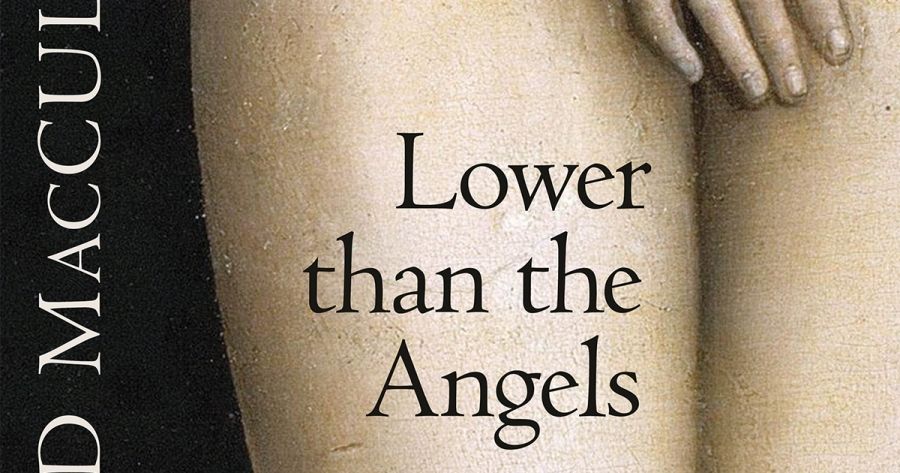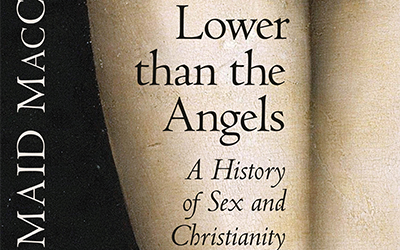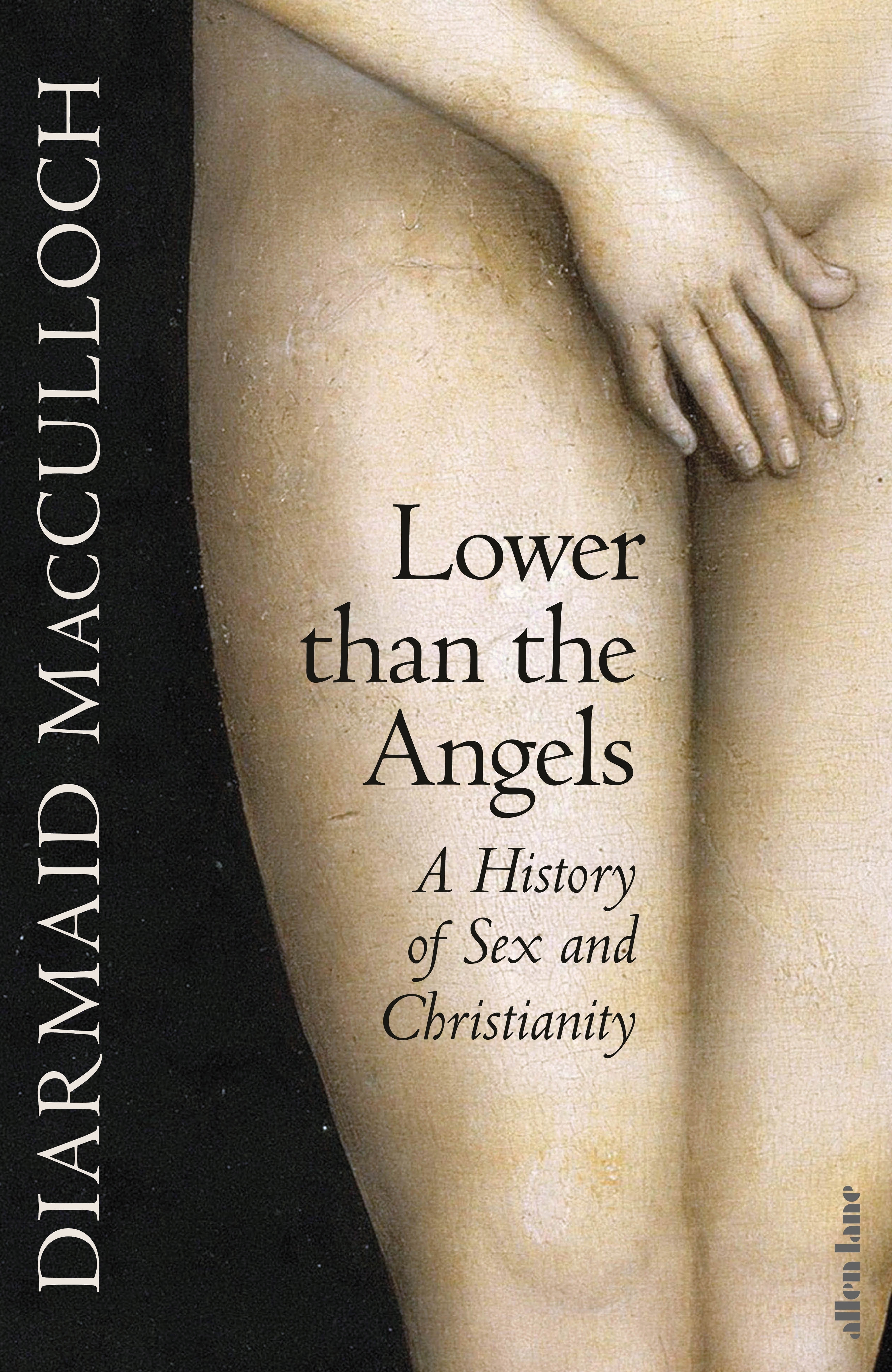
- Free Article: No
- Review Article: Yes
- Article Title: Hypocrisy and cant
- Article Subtitle: Historicising church notions of sexuality
- Online Only: Yes
- Custom Highlight Text:
Christians so often have problems with sex these days. Australians saw this when, during the Marriage Law Postal Survey, the Anglican Archbishop of Sydney begged them to uphold a ‘biblical definition’ of marriage – if there were such a thing. Representatives of every denomination fret endlessly over their responsibility for enabling the sex offenders and abusers of children who were hidden in plain sight in their midst. That some do this even as they fulminate against overt sexual expression in the public sphere (the Paris Olympics opening ceremony anyone?) makes them seem even more out of touch.
- Featured Image (400px * 250px):

- Alt Tag (Featured Image): Miles Pattenden reviews ‘Lower than the Angels: A history of sex and Christianity’ by Diarmaid MacCulloch
- Book 1 Title: Lower than the Angels
- Book 1 Subtitle: A history of sex and Christianity
- Book 1 Biblio: Allen Lane, $80 hb, 688 pp
- Book 1 Cover Small (400 x 600):

- Book 1 Cover (800 x 1200):

Diarmaid MacCulloch’s new book is an important and timely reminder that such grievance-mongering is just hypocrisy and cant. Attitudes towards sexuality have never been fixed, within Christianity or beyond. Views change all the time. Dominant strands in Christian morality always co-exist with sotto voce dissents that press for wider recognition. Advocates of ‘traditional morality’ today ought not to join the conversation until they can accept that the Bible admits no absolutes.
MacCulloch prosecutes his case with a great deal more nuance than a mere reviewer can set out here. Nevertheless, the crux of his book can be reduced to these propositions. Christianity was forged two-to-three thousand years ago as a dynamic amalgam of Jewish and Hellenistic cultures (readers will recall the provocative title of MacCulloch’s earlier work, Christianity: The first three thousand years [2009]). Jews gave Christians their fetish for rules, but Hellenism had them hankering for asceticism. Pythagoras was a key figure: his philosophy, a forerunner of cynicism, advocated deep ambivalence towards sensual experience. Mediated through the Jewish Philo of Alexandria, it became a logic for the generations of Christians who followed Jesus telling them that they must reject the flesh. Clement of Alexandria (c.150–215), for example, noted approvingly how Pythagoreans made love to their wives ‘only for procreation, not for pleasure’. That binary – between what is necessary and fruitful, and what is superfluous and self-indulgent – has remained a cornerstone of many Christian theologies.
MacCulloch’s fearless pursuit of how Christianity’s different churches and confessions have let it percolate through their intellectual traditions – but also how Islamic and Jewish thought resisted it – is one of this book’s major strengths. The sheer impractical weirdness of the Gregorian sexual revolution in the eleventh-century West – largely, if imperfectly, repealed by Martin Luther’s Reformation – comes across startlingly. And yet, if the chapter titles appear to tell a story of Western Christianity alone, MacCulloch’s broader attention to detail belies this. Orthodox suspicion of excessive sexuality, but also celibacy, contrasts with the Latin Church’s confused flip-flopping. Medieval Islam’s sex-positivity, undermined by Wahhabist and Salafist Islams only since the eighteenth century, is another surprising sidenote in one of the central chapters.
Many readers will doubtless look at this book for what it has to say about our contemporary preoccupations with gay sex, women’s roles in the Church, or trans issues. These topics are here, for sure, and that reflects MacCulloch’s keen eye for a broad impact and audience. And yet, the more interesting aspect to MacCulloch’s narrative is not the policing of extramarital sex but rather Christians’ relentless focus on sexuality and roles within marriage, an issue which has arguably framed their entire engagement with everything else. What, in fact, constitutes Christian marriage: consummation or merely betrothal? Can a Christian divorce or be polygamous? Can he or she marry again after the death of a first spouse? Can a Christian husband insist on sex? How much sex can he demand from his wife without sinning? (The old scold Jerome had plenty to say on that one.) If the celi-bate life is superior, how is Christian community to reproduce itself? On the other hand, if marriage is the superior state, why did Jesus himself not take a wife? Of course, as MacCulloch also notes, our obsession with sexuality itself also needs to be put in wider context. It may be the fault-line among Christians today, but other points of disagreement – the nature of orthodoxy, social cohesion, economic activity – mattered at least as much to other Christians at different times and in different places. Reading their agonies and contortions on many subjects ought to make those who now seek to litigate petty private peccadilloes a little humbler: we are all so marginal to the greater cosmic scheme.
History is out of fashion as a tool of debate and analysis here in Australia. Who cares about what people did or said in the past – was that not another country? If we want to know how our bodies work, we should consult a biochemist. To learn about the relationship between the physical and the metaphysical, we might ask a philosopher (preferably one fluent in the ethics or computational possibilities of other worlds and AI).
The greatest value of books such as this one is to expose the myopia of a prevailing perspective on what makes us human. Nothing is more hubristically presentist than to assume that the best or only answer is the one immediately at hand, or one which follows what we right now understand as ‘the science’. When we reject past understandings of an issue – however wrong – we not only junk possible wisdom: we risk reinventing the wheel (and no means of intellectual enquiry is less efficient than that). That history’s answers are complex rather than clear – even more contestable than the ‘evidence based’ approaches nowadays followed in the social and natural sciences – is a benefit. It cautions us against bad thinking.
The desire to classify and police sexuality is an eternal constant: no society ever desists for long. MacCulloch’s work shows us that the views formed within society are never stable, in part because they are never universally held and typically crystallise in reaction to other, previously articulated views. His discussion confronts the fundamental irrationality of the moral frameworks offered, an irrationality inherent in their fusion of logic and empiricism with appeals to arbitrary (textual) authority. Contemporary Christians who seek answers to life’s great dilemmas solely in biblical prognostications claim to be exceptional and authentic. Yet theologians who weigh in on matters of morals have always mediated scripture through philosophy or natural law. That they have done so inconsistently, arbitrarily, prejudicially does not alter the basic methodological mechanics they use to ply their trade.
MacCulloch the historian sees theologians and the rest of us as inevitably cursed to debate every issue of consequence for ever. Such is the human spirit. The key question his work poses then for those invested in pronouncing about their fellow man is how to behave. In MacCulloch’s view, Evangelicals gratuitously hostile to homosexuals are bad – yet hypocritical gay Anglo-Catholics who form unholy alliances of convenience with them to frustrate women priests are worse. We should all learn to check our privilege, for the only certainty is this: at the Last Judgment, Christ, not his interpreters, will enjoy the final word.


Comments powered by CComment